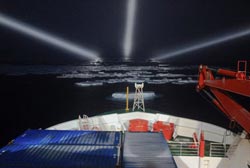Polarstern expedition team departs for the wintery Antarctic

RV Polarstern - into darkness<br>Frank Rödel / Alfred-Wegener-Institut<br>
A group of researchers from the Alfred Wegener Institute, Helmholtz Centre for Polar and Marine Research is flying to South Africa today. However this trip south is no summer holiday, but rather the start of a special journey: on Saturday, 8 June 2013 the research vessel Polarstern will be embarking on an expedition to the Antarctic winter. 49 researchers from institutes in twelve countries together with 44 crewmembers will spend a good two months in the Southern Ocean. They will be exploring the sea ice, the atmosphere and the ocean, until the expedition comes to an end on 12 August in Punta Arenas, Chile.
The research icebreaker Polarstern is one of the few ships in the world that is able to navigate the Antarctic Ocean in the winter. At this time of the year the Weddell Sea, which is the destination of the expedition, is covered by sea ice, and the members of the expedition team will face temperatures of around minus 30 degrees Celsius and the polar night with only a few hours of twilight. These special conditions have meant that not enough research has been carried out into several physical, chemical and biological processes in the Antarctic winter. The Antarctic plays a key role in the Earth System: It is where the so-called deep water, which drives global ocean currents, is formed.
Chief scientist Prof. Dr. Peter Lemke from the Alfred Wegener Institute has assembled an international team and is taking the most modern research equipment on the expedition in order to obtain baseline data in the wintery Antarctic. On the Greenwich Meridian through to the Antarctic coast the team plans to investigate, for example, the fundamental question of why Antarctic sea ice is expanding slightly whilst the sea ice cover in the Arctic is steadily shrinking.
The second half of the expedition then moves on to the incipient spring: the planned route takes the Polarstern from the Antarctic coast in a north-westerly direction, away from the polar night and into the rising sun. The second central question addressed by the research programme looks at which mechanisms permit the ecosystem of the Southern Ocean to come back to life after the long, cold and dark winter.
Impressions from the expedition can be seen at http://www.awi.de and on Facebook (in German language): http://www.facebook.com/AlfredWegenerInstitut
Current reports and maps of the sea ice situation can be found at (in German language): http://www.meereisportal.de/de/meereisexpedition/aktuelle_expedition/
Further information:
http://www.awi.de/en/news/press_releases/detail/item/winter_experiment_in_
antarctic_sea_ice_planned/?tx_list_pi1[mode]=6&cHash=61188d8cf36fb6fbc71f34304ca6b15c
You can also follow the route of the Polarstern live here: http://expedition.awi.de/
Notes for Editors:
Printable images are available at http://www.awi.de/en/news/press_releases/.
Your contact partner in the Alfred Wegener Institute Press Office is Dr. Folke Mehrtens (phone +49 471 4831-2007; e-mail: Folke.Mehrtens@awi.de).
The Alfred Wegener Institute conducts research in the Arctic and Antarctic and in the high and mid-latitude oceans. The Institute coordinates German polar research and provides important infrastructure such as the research icebreaker Polarstern and stations in the Arctic and Antarctic to the international scientific world. The Alfred Wegener Institute is one of the 18 research centres of the Helmholtz Association, the largest scientific organisation in Germany.
Media Contact
More Information:
http://www.awi.de/enAll latest news from the category: Earth Sciences
Earth Sciences (also referred to as Geosciences), which deals with basic issues surrounding our planet, plays a vital role in the area of energy and raw materials supply.
Earth Sciences comprises subjects such as geology, geography, geological informatics, paleontology, mineralogy, petrography, crystallography, geophysics, geodesy, glaciology, cartography, photogrammetry, meteorology and seismology, early-warning systems, earthquake research and polar research.
Newest articles

Trotting robots reveal emergence of animal gait transitions
A four-legged robot trained with machine learning by EPFL researchers has learned to avoid falls by spontaneously switching between walking, trotting, and pronking – a milestone for roboticists as well…

Innovation promises to prevent power pole-top fires
Engineers in Australia have found a new way to make power-pole insulators resistant to fire and electrical sparking, promising to prevent dangerous pole-top fires and reduce blackouts. Pole-top fires pose…

Possible alternative to antibiotics produced by bacteria
Antibacterial substance from staphylococci discovered with new mechanism of action against natural competitors. Many bacteria produce substances to gain an advantage over competitors in their highly competitive natural environment. Researchers…





















